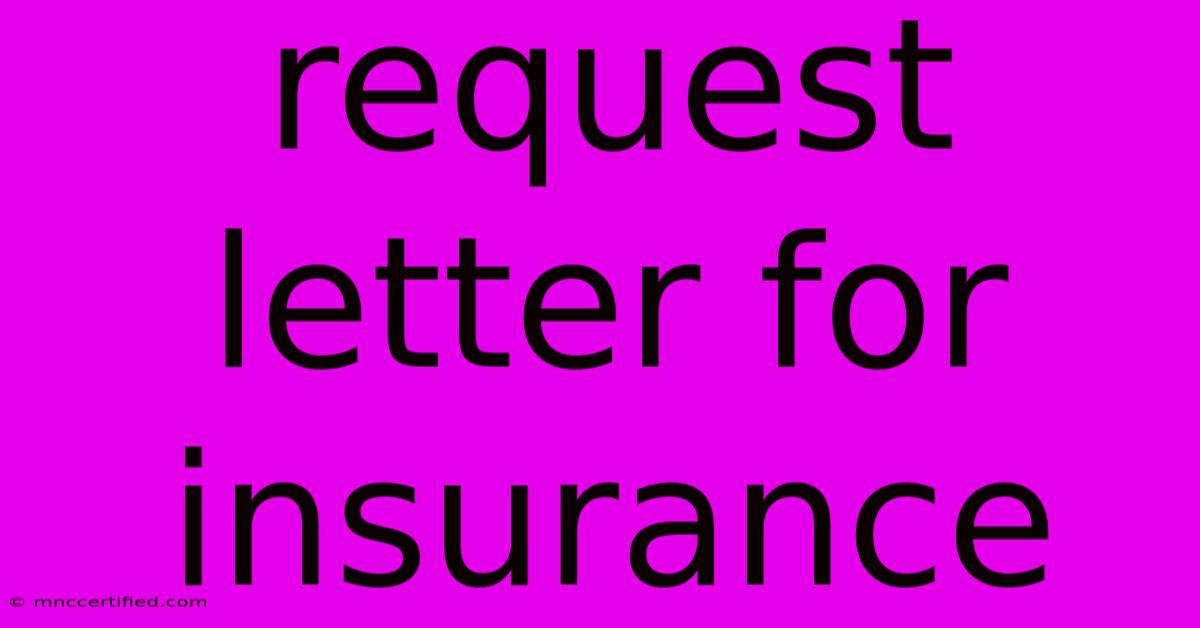Request Letter For Insurance

Table of Contents
Mastering the Art of Writing a Request Letter for Insurance
Writing a compelling request letter to your insurance provider is crucial for a smooth claims process. A well-crafted letter clearly outlines your situation, adheres to the insurer's requirements, and significantly increases your chances of a positive outcome. This guide will walk you through crafting a professional and effective request letter for various insurance needs.
Understanding the Importance of a Well-Written Request Letter
Before diving into the specifics, let's understand why a well-written request letter is so important:
- Clear Communication: It ensures your claim is understood precisely, minimizing ambiguity and potential delays.
- Professionalism: A professional letter demonstrates your seriousness and respect for the insurance company.
- Faster Processing: A clear and concise letter makes the claims adjuster's job easier, leading to quicker processing.
- Supporting Documentation: It acts as a central point of reference, guiding you to attach all necessary supporting documents.
- Legal Protection: A detailed record of your claim can be invaluable in case of disputes.
Key Elements of a Successful Insurance Request Letter
Regardless of the type of insurance claim (health, auto, home, etc.), your letter should include these essential elements:
- Your Contact Information: Your full name, address, phone number, and email address should be clearly displayed at the top.
- Insurance Policy Information: Your policy number, effective date, and the type of insurance coverage are essential.
- Date of Incident: State the date when the incident that led to your claim occurred. Be precise.
- Detailed Description of the Incident: Provide a clear and concise account of what happened. Avoid emotional language; stick to facts.
- List of Damages or Losses: Specifically outline the damages or losses you incurred. Be thorough and precise. For example, in an auto accident, list all damaged car parts. In a home insurance claim, detail the extent of the damage to your property.
- Supporting Documents: Clearly state the documents you're including (e.g., police report, medical bills, repair estimates).
- Amount of Claim: Specify the total amount you're claiming. Base this on your documented losses and the terms of your policy.
- Request for Action: Clearly state your request—e.g., reimbursement, repair, replacement.
- Closing and Signature: End with a professional closing ("Sincerely," "Respectfully") and your signature.
Sample Request Letters for Different Insurance Types
Here are examples to adapt to your specific situation:
Sample Request Letter for Auto Insurance Claim:
[Your Name] [Your Address] [Your Phone Number] [Your Email Address]
[Date]
[Insurance Company Name] [Insurance Company Address]
Subject: Auto Insurance Claim - Policy Number [Your Policy Number]
Dear [Insurance Adjuster Name or To Whom It May Concern],
This letter is to formally request a claim under my auto insurance policy, number [Your Policy Number], for an accident that occurred on [Date of Accident] at [Time of Accident] at [Location of Accident].
[Detailed description of the accident, including other parties involved, if any].
The damage to my vehicle includes [List of damages, e.g., damaged bumper, broken headlight, etc.]. I have attached estimates from [Repair Shop Name] totaling [Amount]. I have also included a copy of the police report ([Police Report Number]).
I request reimbursement for the repair costs as per my policy coverage.
Thank you for your prompt attention to this matter.
Sincerely, [Your Signature] [Your Typed Name]
Sample Request Letter for Health Insurance Claim:
Adapt the above template, replacing the auto accident details with medical details:
- Date of Service: The date you received medical treatment.
- Medical Provider: The name and contact information of your doctor or hospital.
- Diagnosis: Your diagnosis and treatment received.
- Medical Bills: Attach copies of all medical bills and receipts.
Sample Request Letter for Home Insurance Claim:
Similarly, tailor the template to reflect home-related damages. Include:
- Type of Damage: Fire, flood, theft, etc.
- Extent of Damage: Detail the affected areas and the damage's severity.
- Repair or Replacement Costs: Include estimates from contractors.
Off-Page SEO Strategies to Boost Your Article's Visibility
To improve the visibility of this article, consider these off-page SEO strategies:
- Guest Blogging: Write guest posts on relevant insurance blogs or websites, linking back to your article.
- Social Media Promotion: Share your article on relevant social media platforms.
- Forum Participation: Participate in online forums related to insurance and subtly link to your article when appropriate.
- Link Building: Reach out to other websites in the insurance niche and request links to your article.
By following these guidelines and tailoring them to your specific situation, you can craft a powerful request letter that maximizes your chances of a successful insurance claim. Remember, clarity, detail, and professionalism are key.

Thank you for visiting our website wich cover about Request Letter For Insurance. We hope the information provided has been useful to you. Feel free to contact us if you have any questions or need further assistance. See you next time and dont miss to bookmark.
Featured Posts
-
Drummer Bob Bryar Dies At 44 In Tennessee
Nov 30, 2024
-
Renewed Tensions In Syrias War
Nov 30, 2024
-
Grint Loses Tax Case Owes 1 8m
Nov 30, 2024
-
Cuyahoga County Israel Bonds
Nov 30, 2024
-
Assisted Dying Bill Passes First Stage
Nov 30, 2024